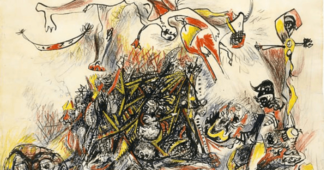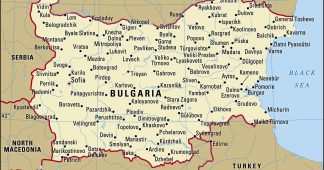By William Mallinson
Athens, 4 June 2022
Introduction
Having considered a plethora of articles pontificating on Moscow’s military actions in Ukraine, whether journalistic, academic, ideological, purely propagandistic and/or emotional, I feel constrained to say, as a diplomat turned historian of diplomatic history, that there seems to be a lack of understanding of why the so-called ‘international community’ (read ‘collective West’) currently seems to be suffering from a bout of ignorance, confusion and inconsistency in its inter-state relations. At the risk of sounding supercilious, I shall explain why so many agenda-driven pundits, in their shallow ‘analyses’, do not seem to have a clue about why our alleged leaders are running around like headless chickens. To begin to understand, we need to go deep into the causes of our institutional instability. These causes begin with the individual.
My starting point is that the current disorder is directly related to the quality of our alleged leaders, who no longer seem to have the space to reflect on reality. This is reflected in society as a whole. Put more subtly, in order to reflect, one needs the space not to have to think. Think about this (if you have some mental space), and you may begin to get my point. If you cannot grasp this, then you had better stop reading, since you may have inadvertently succumbed to the phenomenon of mind-numbing globalism-induced speed and greed assailing much of the ‘international community’ (i.e. the ‘West’), which has resulted in a lack of awareness of history. The teaching of history in western universities is indeed dying. Opinions have been replaced with appinions, and diplomacy with Twittering and Facebooking. Let us now deal with the salient factors, beginning with our mental underpinning, and then comment on the current ‘Ukrainian stupidity’.
Fear of Simplicity
In his history of the Peloponnesian Wars, Thucydides wrote that the simple way of considering matters, which is so much the example of a noble nature, was seen as an absurd characteristic, and soon died. Humans, most of whom feel insecure, do indeed tend to avoid simplicity, often hiding in theory, psychological models and circumlocution to justify their behaviour or approach to problems. In short, they fear being naked and exposed, often for no logical reason. Many look only to the future, ignoring the fact that only history in its purest form – the past – exists. As all is permanently flowing, the present cannot exist, as it becomes history as it happens. It follows that the future cannot exist, as it, too, becomes history as it occurs. By future, then, we really mean our desires and plans. And by ‘present’ we mean ‘awareness’. Mankind expends great effort in ignoring, or cherry-picking from, history, even decrying it as a dangerous irrelevance to progress (whatever ‘progress’ actually means).
It seems that many pundits are unaware of what triggered the current disorder. For example, in 2004, I took the risk of predicting to myself that the addition of ten new members to the EU, including atavistically Russophobic Poland and the Baltic statelets, also NATO members, would lead to a lack of EU foreign policy cohesion, and to institutional instability. And so it has, but many of our so-called western analysts appear oblivious to even this recent history (let alone of earlier history), preferring to concentrate on the current engineered narrative – often imposed – of Russia trying to re-create the Soviet Union, which is balderdash. Let us now try to think a little deeper, and leave the gutter press – and ‘mainstream’ – narrative.
From Individual to State.
Individual human characteristics such as fear, insecurity, greed, love and hate are what make up groups, institutions and states. The more secure a state is and feels, the less likely it will be to behave irrationally and aggressively, just as is the case with an individual. But when lack of communication sets in, suspicion and fear increase, as does, concomitantly, lust for power. As Thucydides wrote, ‘love of power, operating through greed and through personal ambition, was the cause of all this evil.’ The evil was of course the Peloponnesian Wars that so devasted the Greek world. The result of suspicion and greed has been with us since time immemorial, and serious statesman like Bismarck and de Gaulle understood this well. Today matters have altered: there are few real statesmen left in the West. Comparing the likes of de Gaulle, Willi Brandt, Jean Monnet and Helmut Schmidt with Anthony Blair, Boris Johnson, Liz Truss and Joe Biden, is like comparing thoroughbred horses to molluscs. Blair proved to be a consummate liar, Johnson both a liar and clown, Truss an ignorant fanatic and rather silly Russophobe, and Biden simply senile and not up to the job. Even Angela Merkel, the Teutonic turtle, comes off well when compared to the latter, but has been replaced by an ineffective Chancellor whose main claim to fame seems to be in making U-turns.
Such people seem more emotional about nations, rather than states, not understanding the difference, and that states came into being in order to control the atavistic lusts of humans. Any even brief reading of Giambattista Vico (beloved of James Joyce) will grasp that the world moves from chaos and back to order, and then back to chaos. At the moment, there is increasing chaos, particularly in the so-called ‘West’. Yet still most people in the ‘West’ have been systemically and systematically inculcated with the idea that they are an example to the rest of the world, which is apparently less developed and lacking in real values.
Mental Confusion
Many pundits lack clear understanding of the difference between the concept of ‘state’ and ‘nation’, the latter muddied by the idea of the ‘nation-state’, a veritable oxymoron. Etymologically speaking, a nation is where one is born. Nowadays, a nation is a group of people of similar language, culture, religion, blood and heritage, usually born in the same area. As such, very few nations correspond precisely to state borders. Perhaps the Jewish State can claim to be, since the majority of its inhabitants are Jewish. The question becomes tricky, however, when one considers that more Jews reside outside the Jewish State than inside it. In this sense, the Jewish nation covers most countries of the world. Mass movements of populations have rendered a completely precise definition of a nation difficult. For example, when an American president speaks of the American nation, one can wonder whether he means anyone born in the US, which includes original indigenous tribes and elements of various other nations, or whether he really means ‘state’, but prefers the more emotional sounding ‘nation’.
The concept of state is simpler: a group of peoples living within a defined and internationally recognised border, with its own government and sovereignty. As such, territory is the essential factor. We know enough about the ancient Greek city states and Renaissance Italy to see that states based on territory have existed for a long time. One can also argue that pre-imperial England and France were states, rather than empires. But when we come to the term ‘nation-state’, matters become complicated.
First, many IR analysts, often of the realist school, use the words ‘nation’ and ‘state’ interchangeably. A way of avoiding this ambiguity is to use the word ‘country’, but even that is vague. To confuse the issue, politicians and others use the term ‘national interest’, when they really mean ‘state interest’. Even the term ‘international relations’ lacks in precision, since it really means ‘inter-state relations’.
Unlike with the word ‘state’, it is difficult to come to terms with the term (pardon the pun) ‘nation-state’; it seems to be an utopian ideal at best or an oxymoron at worst. The fixation with the Peace of Westphalia of 1648 by many IR analysts and historians has rather muddied the waters, since there are claims that the concept of sovereignty arose out of the various associated treaties. While it is true that various sovereign German states were created out of the Holy Roman Empire, and that they were able to choose whether to be Roman Catholic or Protestant, and that the principle of equality between states was established, Jean Bodin had already established the concept of sovereignty in 1576, in his work Les Six Livres de la République, in which he argued that a state should be sovereign. There are also differing interpretations of sovereignty, perhaps one of the more extreme versions being encapsulated in Louis XIV’s statement ‘L’état, c’est moi’. A geohistorian might prefer the word ‘independence’. But for all the Peace of Westphalia’s contribution to the idea of sovereign states respecting each other’s sovereignty, it could even be argued that it served as a failed attempt to establish a permanent peace, since in fact it led to further strife, this time between nominally sovereign countries, perhaps because de Groot’s ideas on international law, encapsulated in his book ‘On the Law of War and Peace’, published in 1625, were not to every sovereign state’s liking.
As to the idea of Westphalian religious freedom, in 1685, France revoked the Edict of Nantes, which guaranteed freedom of worship to Protestants in 1598, and England continued to discriminate against Roman Catholics until well into the Nineteenth Century. Religion and nationalism continue to be a problem to this day, as the case of the break-up of Yugoslavia and, at a world level, Moslem fundamentalism and Christian Zionism, demonstrate. Attempts to create states based on nations have failed, as for example the case of the Kurds and Yugoslavia dramatically show, and continue to show. Consider the history of Albanian nationalism, Bosnia-Herzegovina and Macedonia. The nation-state is simply an ideal, rendered impossible because the word ‘nation’, with its emotional content, clashes with the cold and rational state. A homogenous nation governed by its own sovereign state is more of an ideal than a reality, although Iceland and Japan may lay claim to a measure of convergence.
Ukrainian Identity Weakness
Technically and legally, Ukraine is a sovereign state, but hardly a solid one: a mishmash of Slavic tribes and religions, a history of strife and border changes, only papered over by the Soviet experience. Then, just as in the Balkans, atavism took over, and previously externally imposed artificial constructs began their inevitable collapse. As an astute British ambassador wrote, ‘it is certainly arguable that the younger the state, the more the quest to seek an identity’. The older and more established the state, the more entrenched will be the characteristics of its people, since the institutions established hundreds of years ago are part and parcel of those states. Such states (and here we are thinking of, for example, Russia, France, England and Japan) have a certain linguistic continuity and an unbroken line of literature going back to even before the state was formed. In the case of Ukraine, the oldest institution is the Russian Church.
Geopolitical Stupidity
To crown it all, we have the current obsession with the term ‘geopolitics’, used almost ad nauseam by politicians, journalists and academics today to explain matters. Usually, they do not even know the difference between geopolitics and geostrategy, using the terms interchangeably, blissfully unaware of the dangers of over-simplification (as opposed to their shying away from simplicity). It all boils down to the fact that geopolitics has proven to be an excuse for creating unnatural borders based on business, and grabbing other people’s resources. It is enough to look at a map of the Middle east and Africa to grasp this. Certain Arab states were created because of oil interests. Saudi Arabia and the Gulf States come to mind. The fact that the close links of these countries to the West can be explained geopolitically (thanks to oil or, as I call it, black blood) demonstrates that geopolitics today has little to do with people or morality, but more with the interests of large corporations and the governments that support them in the name of ‘national’ interests. People become geostrategic fodder. From a British viewpoint, geopolitics means keeping Germany and Europe away from Russia, as it has done for at least the last two hundred years, and is currently doing, along with US-controlled NATO. Morality and regard for human life have little to do with geopolitics, whose proponents tend to suffer from inconsistency and hypocrisy.
Inconsistency and Hypocrisy
Listening to the US Secretary of State, Blinken, pontificating on a rules-based international order is a bizarre experience, given that the US has itself been destroying this order for several years, by unilaterally pulling out of international treaties, and illegally attacking sovereign states, with its acolytes. The pundits seem to have forgotten Kosovo, Iraq and Libya. When former US president Bush, of Iraq-killing fame, mixed up the Ukraine and Iraq, this spoke volumes for his stupidity, even if after sniggers from the audience, he recognised his Freudian slip. To hear a British ambassador speak to some Athenian students of ‘we, the forces of good’ in the run-up to the illegal destruction of Iraq reduces him to an arrogant puppet propagandist. Given what has happened to western diplomacy in the age of digitalised globalism, this not surprising.
Death of Western Diplomacy
Not all western diplomacy has succumbed to egotism, digitalisaton and Twitterisation: the Vatican, for example, still sticks mainly to tradition. Professional diplomats were once the nuts and bolts of relations between states. Before electronic communication came to the fore, they had considerable authority, but once political leaders in different countries could communicate with each other on the telephone, jump on an aeroplane to meet their homologues abroad, and nowadays hold video conferences, ambassadors and their staff and officials at home found their importance diminishing to that of a public relations agent. Nevertheless, their advisory rôle remained crucial: a foreign minister can hardly be expected to know his counterparts the world over, let alone the hundreds of bilateral issues between his country and the two hundred odd countries with which his country has relations.
But globalisation, and the speed of its accompanying digital technology, have had a major effect on traditional diplomacy. Take the case of the British Foreign, Commonwealth and Development Office (FCDO): the registry no longer exists, the typing pools have disappeared, and ambassadors no longer write valedictory despatches. Despatches as a whole are disappearing. With the slow but inexorable introduction of the desktop computer, e-grams (the first one was sent in 2004) have replaced telegrams, and minutes are e-mailed to colleagues, sometimes in the same room. Since there are no registries, it is far more difficult to access the file: instead, there is a series of cumbersome electronic steps to be gone through. Although all communications are meant to be registered, the procedure is far too time-consuming for most officers to bother to register a minute, letter or e-gram. In the serious days, whenever one read a letter, telegram or report, and had acted on it, one wrote either ‘pa’ (‘put away’) or ‘BU’ (Bring Up’), with a date. Before filing the paper, the registry clerk would note the ‘BU’ date, and give the file to the desk officer on the desired date.
All that is gone. According to a recently retired ambassador, the collective memory has gone, and most written work is done ‘on the hoof’. Where once the FCO had three personnel departments, namely Personnel Operations Department, Personnel Services Department and Personnel Policy Department, there is now a ‘Human Resources Directorate’. Where there was once Training Department, we now have the Human Resources Directorate, which includes a ‘Recruitment and Development Department’, including in turn a ‘Learning and Development Team’.
The FCDO now uses the language of globalisation. This change has been accompanied by a dumbing down in training. A human resource (person) no longer benefits from week-long – and longer – drafting courses, which were once run by retired diplomats. They are now offered through ‘Civil Service Learning’. Thus, much of the FCO’s past expertise in training has been subsumed into the broader Civil Service, and partly stultified.
The upshot of all this is that diplomats meet each other far less during their working day, huddled as they are in front of their computers. On-line meetings also often replace face-to-face ones. Electronic communication substitutes for natural communication. The American spell-check, based on American operating systems and Windows has by and large replaced the draft wending its way upwards to be perfected. There is far less formality. Only older members of the service sign letters to their homologues with ‘Yours ever’, as was once the accepted custom. As for the enjoyable quick gossip sessions, the demise of the Registry has killed them off.
A ‘Chief Operating Officer’ (once known as ‘Chief Clerk’) of the Diplomatic Service proudly announced not long ago that six ministers and eighty ambassadors were on Twitter, almost as if this is the be-all and end-all of successful diplomacy and communication. Yet it is well known how controversial Twitter can be, and that it can lead to all kind of spats, not to mention being open to attack from virtually any quarter. Twitter is essentially a private game, often for people to bloat their egos. Those who use it to promote their official views or careers open themselves to unwarranted attacks from cranks and enemies. To imply that it is a useful part of diplomacy is off-beam. It can actually lead to a dissipation of seriousness, and is but a cheap substitute for serious analysis and evaluation, so vital to the formulation of policy. For even if there is still some traditional formulation of policy, it is surely being eroded subliminally in the minds of those responsible for the interests of the United Kingdom. As Guicciardini wrote: ‘Any man who takes upon him to introduce changes into the government of Florence, unless he be constrained thereto by necessity or happen to be at the head of affairs, lacks wisdom. […] after the change is made you are condemned to endless torment in having always to fear further innovation.’ We see how fashionable innovations can create their own momentum, and get out of control. This is what is currently happening, with the Ukrainian stupidity a prime example.
Values
In the West’s current obsession to attack all things Russian, we are constantly bombarded with the phrase ‘our values’, as if we are better than the rest. The word ‘democratic’ is used non-stop in the propaganda. Never mind that the American/NATO export of our ‘superior’ values has led to millions of dead civilians in lesser countries, rendering them failed states, and worse than before. Never mind that NATO member Turkey is dictatorial in many ways, or that the UK has a political prisoner, Julian Assange. In fact, much of the West has descended into moral decadence and decay, in the name of ‘neo-liberalism’, with ‘wokishness’ and egotism in the ascendant. Now it is considered good practice to teach little schoolchildren about unnatural sex and changing gender (as if that is possible!). LGBTQ etc rules the roost. Indeed, it is one of the FCDO’s official aims to export the message to the world. This is western morality. A clear exception in the West is Hungary, which has a decent leader. Russia has realised the insidious influence of the neo-liberal woke brigade, and has taken steps to prevent its children being seduced.
If any of you think that this is irrelevant to the title of this brief essay, think again: people as a whole, including our leaders, have been affected by the decay which, let us note, includes the undermining of education. Not so long ago, the British Prime Minister, Cameron, spoke of ‘broken Britain’, referring to family life. He would have done well to mention the increasing disappearance of history. As we start to conclude, bearing in mind our starting point that the current disorder is directly related to the quality of our alleged leaders, who no longer seem to have the space to reflect on reality, let us mention the German Green Party: it has transmogrified from a peace-loving, environment-loving movement to a war-mongering anti-Russian party. It is bizarre that a youngish woman, Annalena Baerbok, is a Green, and German Foreign Minister, doing all she can to promote NATO’s anti-Russia agenda. In this connexion, I wonder if any of you has noticed the increase in the number of youngish women politicians in Europe, presumably in the name of having to be politically correct and wokish. A recent photograph of foreign ministers of the G7 shows four women and four men. The women are all wearing trousers. One is inclined to wonder whether one day some of the men will be wearing skirts or dresses. Even the revered and reviled Margaret Thatcher would wear a dress. Should anyone think that I am tending towards misogyny, think again: one of the most impressive women on the world stage is the Russian foreign ministry spokeswoman, Maria Zakharova. She makes Baerbok look like a small-minded and badly educated child, just as Sergei Lavrov does. Indeed, the quality of Russian officials reflects a superior education and knowledge of history, as well as a sense of decent manners.
Finally
If you have got this far, you may agree that it is time to conclude. As a former diplomat turned historian of diplomatic history, this is what I have gathered, simply put: following the West’s failure to westernise Russia during the Yeltsin years, it was unable to accept this failure, since the NATO business juggernaut had no reverse gear. Once atavistically anti-Russian Poland and the Baltic statelets had jumped on the bandwagon, prodded by the US and EU, it was only a question of time before Moscow would have to react in one way or another. NATO’s eastward expansion continued, for no logical reason. The Maidan coup was the last straw, when the Donbas was attacked. The Kiev regime began to kill Russian-speakers, and despite the Minsk agreements, Kiev did not honour them. Moscow felt morally obliged to help its Russians. To cut a long and tortuous story short, there is now a proxy war between NATO and Moscow. NATO has no reverse gear, and the low-quality western ‘leaders’ are simply not up to the job.
Strange though it may seem, it has fallen to the cynical but realistic Henry Kissinger to say what needs to be done: Ukraine must cede territory to Russia for the killing to stop, and to avoid nuclear war. As for the pundits saying that things will never be the same again, this is nonsense: Ukraine will simply return to its former natural shape as a small and hopefully neutral buffer state. To paraphrase Guicciardini, things have always been the same, the past sheds light on the future, and the same things return, albeit in different names and colours. He also wrote: ‘In my youth I believed that no amount of reflection would enable me to see more than I took in at a glance. But experience has shown me this opinion to be utterly false; and you may laugh at anyone who maintains the contrary. The longer we reflect, the clearer things grow and the better we understand them […] The affairs of this world are so shifting, and depend on so many accidents, that it is hard to form any judgment concerning the future.’
I doubt very much whether the likes of Baerbok and Truss have even heard of Guicciardini, but I’ll wager that Lavrov has. Only history exists.
We remind our readers that publication of articles on our site does not mean that we agree with what is written. Our policy is to publish anything which we consider of interest, so as to assist our readers in forming their opinions. Sometimes we even publish articles with which we totally disagree, since we believe it is important for our readers to be informed on as wide a spectrum of views as possible.











